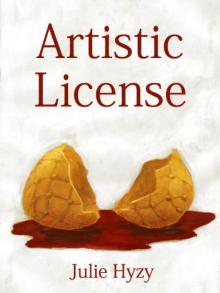- Home
- Julie Hyzy
Virtual Sabotage Page 15
Virtual Sabotage Read online
Page 15
“You don’t understand. Remember when we started this—”
“I do remember,” Patrick said. “But I’m not sure you do. Step back and really look at what’s happening. The initiative is not going the way anyone expected. People have died. Because of us. That was never part of the plan. This is chaos.”
“Chaos is exactly my point,” Werner said. “And yes, a few situations have gotten out of hand, but it truly is all for the greater good. Sub Rosa has the potential to bring order back to the world.”
“It won’t. Not the direction Celia is taking it. Werner, listen to your gut. I know it’s telling you the truth.”
Werner shook his head.
Patrick continued, “The other directors respect you. Why not work with them to scale back? To abandon Sub Rosa and redirect our efforts back into academia and medicine, the way Simon and Vefa originally intended?”
“The world isn’t ready for enlightenment. They’ll fight it, like they do everything else that’s good for them. Sub Rosa is the only way to retrain their brains.”
“Train them? Or paralyze them? There’s a difference, you know.”
“We can’t allow the world to be run by VR addicts.”
“We helped create those addicts.”
Werner wagged his head from side to side. “What we did was help identify the simple-minded lemmings of this world. Those who rely on simulated entertainment to satisfy their foolish desires. We need the true geniuses of this world—like Simon, for instance—to envision our better existence. How can society’s intelligentsia succeed when every idea they propose is shut down by large groups with small minds and loud mouths?”
“But who decides what’s right?” Patrick asked. “Celia?”
“Patience, Pat. Turning the ship takes time. This is but a temporary maneuver. We’re doing all we can to clear the way for leaders and visionaries to reclaim access to our resources. Those of us who eschew VR as entertainment fully intend to work with—and for—these geniuses in our midst. They will be free to invent and create and inspire. Society will flourish. You and I will be proud of ourselves once we attain these goals.”
“You still believe that?”
“Of course I do. And so do you,” Werner said. “If you didn’t, you wouldn’t be here. Feeble brains not only crave easy entertainment, they’re also incredibly pliable. We see that at Virtu-Tech every day. Our goal is to herd them into compliance.”
“More like ‘into submission.’”
“A crude term.” Werner made a so-so motion. “But apt. While the easily amused dunces dally in their ridiculous VR adventures, those with intelligence, strength, imagination, and resilience will be free to create a working utopia—or as close to one as we’ll find here on earth. Finally, we’ll see a world of people who do more than simply exist. A world of people who are worthy.”
“A master race, in other words,” Patrick said.
“What’s gotten into you today?”
Patrick clenched both fists. It would not do to tip his hand. Not even to his own brother. He rubbed his forehead. “Just stress talking,” he said. “I’ve had more than my fair share of Celia of late.”
“Those who seek to stop us—these dissidents—are more than welcome to join our ‘master race’ as you so amusingly term it. If they’re enlightened enough to reject the mindlessness of VR, then perhaps we want them on our team. That’s the difference. We’re inclusive to those who are eager to better themselves. We will welcome them into the fold once we’ve established structure. Once we’re ready.”
“Celia will never be ready. She doesn’t want anyone else making decisions. She won’t stop until she’s the only power left standing.”
“Would that be so bad?” Werner dropped his bulk into his office chair and crossed his arms. He stared up at Patrick for a long few seconds. “Think about the mess this world is today.”
Not understanding, Patrick shook his head.
“Our mother,” he said. “Would you trust her to make sensible decisions?”
“Why are you bringing up Mom? I don’t see the relevance.”
“You will.” Werner pointed to the chair opposite him. “Sit.”
Patrick sat.
“Both of our fathers were spectacular losers. You know that, even if you were too young to see as clearly as I did. Our mother’s carelessness left me—and then you—hungry, not just for food, but also for kindness, hope, dignity. We were left to our own devices, you and I.”
Patrick drew a sharp breath.
“We could have faltered,” Werner said quietly, forestalling an interruption. “We could have turned out exactly like her—two more stupid little fools waiting for technology to solve their problems.”
“Werner,” Patrick began, “I know that you had it much harder than I did. And you know I appreciate all you’ve done for me—”
“What we’ve done together.” Werner said. “We were smart enough to fight our way out of oblivion. That’s why we—and people like us—need to take control. Because the ignorant people in this world are running the show.”
“And you truly believe this is the best way to do that?”
Werner’s animated expression fell. “It’s the only way.”
“Tell me about Tate.”
Werner seemed to snap himself out of a reverie. “Why?”
“Until Tate got involved, things were running smoothly.”
The idea worked its way across Werner’s features. He shook his head. “No. Tate killed Charles Russell. He wouldn’t do that if he was one of them.”
Patrick winced. He missed Charlie. “But Russell died before you got the information you needed, right?”
Werner worked his jaw.
Pressing, Patrick added, “What’s his name? His full name? I only know him as Tate. Give me what you have on him, and I’ll start an investigation.”
“I don’t believe Tate is the issue here,” he said. “Celia recruited him herself. And he’s handling a situation for us right now. He couldn’t have switched the implants. It’s impossible.”
“What sort of situation is he handling?” Patrick lifted his index fingers. “I ought to be aware of his activities.”
“No need to investigate him,” Werner said, looking away for a moment. “He’s busy following that envoy.”
Werner’s revelation didn’t register immediately.
“Who?” Patrick heard his own question as though from a distance.
“Russell’s fiancée, Kenna Ward.”
“Following her?” Patrick didn’t move. “Why?”
“To see if she’ll lead us to the dissidents. So far, he’s come up empty.”
“Probably because”—Patrick tried to keep his voice from betraying his rising panic—“there’s no indication that she’s involved at all. None. I told you that. I went through all of Charlie’s…” In his agitation, he caught himself using the more familiar form of his friend’s name. “. . .Charles Russell’s documents myself. You know everything I found in them. Russell considered bringing her in later but hadn’t before he was killed. She’s completely oblivious.”
“Just because you couldn’t find proof doesn’t mean none exists,” Werner said. “Thanks to the latest trouble in our warehouse, Celia is doubting my leadership.” A glimmer of fear sparkled behind his set expression. “You’re right about one thing: She’s ruthless. Determined to succeed at all costs.”
“Werner, do you hear yourself?”
“It’s out of my hands now,” Werner said. “Tate will do whatever’s necessary to get to the truth.”
“I don’t trust him,” Patrick said. “Call him off.”
Werner shook his head. “If he truly had a hand in the mystery of these missing Sixes, we’ll find out soon enough. I’ll wait until I get his report on interrogating this envoy.”
“He killed Charlie. What’s to stop him from murdering Kenna?”
Werner looked away.
THIRTY-TWO
Celia Newell looked up when her assistant Drew came in to let her know that two of her guests had arrived. The young man stood across the chilly office, hand on the doorknob, waiting for direction. Celia sucked in her cheeks, biting back her impatience. “What about Adrian Tate? Is he here yet?”
“Landed and on his way,” Drew said.
“Let me know when he arrives.” She locked eyes with the young man as she waved the air. “Send Glen and Simon in.”
The moment Drew turned, Glen brushed past him and strode across the carpet, twisting briefly to make sure he’d outpaced his companion.
“We’ve got trouble,” he said quietly. “Simon wants out.”
Celia raised her eyebrows. “He’s not happy?”
“He’s had a pang of conscience.”
“Can’t you handle him?”
He opened his mouth, closed it again, then said, “He’s threatening the whole project,” he said. “The guy is out of control. I thought if you talk with him—”
As if on cue, Simon Huntington entered. Though short in stature, with his mass of silver ringlets and a pair of ancient-looking gold-rimmed spectacles on his aquiline nose, he looked every inch the genius he was. His shoulders tense, his glare penetrating and direct, he made his way to Celia’s desk, his body practically zinging with defiance.
“Simon,” Celia said, standing. “How are you, my dear?”
The old man shook his head. He held her gaze for several seconds before directing his attention to the portrait of Vefa Noonan on the wall.
“It was our dream—your father’s and mine,” he said, “to revolutionize the world. Unite it through the exploration of fantasy. Take inspiration to a new level by allowing everyone to realize his or her dreams, albeit briefly.”
“And how fortunate you are to see it come to fruition,” Celia said.
“Fortunate?” The old man’s expression soured. “Vefa is fortunate, perhaps. Because he isn’t here to see what you’ve done to our creation.”
Now it was Celia’s turn to frown. “Simon, whatever’s bothering you, get on with it. I have work to do.”
“Concerning your most recent endeavors, no doubt.” He bounced a fist against his lips as though struggling to control himself. “Don’t think I haven’t figured out what has been going on. What you’re planning.”
She raised her eyebrows in a display of placid disinterest. “Suppose you tell me what you think that is.”
“Look, Simon,” Glen began, “I’ve been trying to tell you. It’s not like you think.”
“Shut up,” the old man snapped. He turned back to Celia. “Vefa and I had a vision. We saw where the world was going. We jumped on opportunity and created something no one ever believed possible. When he died, he left it in our hands. Yours and mine. It was to be his legacy.” His gaze held hers. “And look at us now. Look what we’ve done with the gift he gave us—the gift he foolishly shared with you.”
She sighed. “Simon, you’ve been well compensated for your work at Virtu-Tech. If you’re not happy here, I’ll be glad to release you from any further obligations and provide you a healthy settlement.”
Simon trembled with rage. “How dare you say that to me?” He thumped a withered hand against his chest. “We built this company, Vefa and I. I won’t stand by and see our dream corrupted.”
Glen leaned in, palm extended. Before he could speak, the old man swatted him away.
“You and I both know you’re not going to be satisfied with brown soap or candy bars made of flaxseed,” Simon said quietly.
“I’m not?” she asked.
“Don’t patronize me.” The old man’s mouth twisted downward. “If it weren’t for this glitch in Chicago, you’d already have everything in place. Then, God help us all.”
“How is it you’ve heard about the glitch in Chicago? I don’t recall mentioning that to you.” Turning to Glen, she asked, “That tidbit hasn’t made the news, has it?”
“No,” Glen said. “No one outside the meeting should have been aware.”
“Interesting,” Celia said.
“It doesn’t matter how I found out.”
“Oh, my precious, sweet man. It most certainly does. I’ve done my best to ignore the rumors I’ve been hearing about you: conspiring with the dissidents; you working to undercut my every move. I did it because my father loved you like a brother. He would have urged patience.” She waved toward Vefa Noonan’s portrait. “But, like you, he was a foolish man. My patience has reached its limit. You’ve become rather annoying in your refusal to appreciate Virtu-Tech’s potential.”
“Its potential?” Simon repeated, incredulous.
“What do you want, Simon? A bigger pension and a retirement villa on a remote island? Fine, I’ll see that you get what’s coming to you. Just walk away. This no longer concerns you.”
The old man shook with fury. His arm shot out, his index finger jabbing at the air in front of her desk. “I will not be a party to this anymore. I went along with it, testing the limits for what I thought was the greater good. We envisioned this as a way to blend diverse populations and help them find common ground. Virtu-Tech was meant to boost our brains’ evolution. It was designed for the betterment of humankind.”
“Our aspirations are not so dissimilar, Simon. I wish you could see that.”
“A human’s free will is his life. Can you not understand that?”
“What you don’t understand is that people happily trade that freedom for a promise of security. Happens every day.” She smiled. “Virtu-Tech can provide that. Permanently.”
“With mind control.”
Glen cough-laughed. “It’s not mind control, not really,” he said. “We may influence sales of consumer goods. A little bit. No real harm done.”
Simon turned to him. “Are you that obtuse? Celia doesn’t care about your soaps and your candy bars. She has her eye on a much bigger prize.”
Celia raised a hand. “Simon, please. Not now.”
The elderly man glared at Glen. “She intends to rig the elections. She will be the next president of the United States. Didn’t you know that? And from there what will she reach for next?”
Glen sucked in his surprise. His face lost all color.
“Oh, Simon.” Celia chuckled. “That would be unethical. Immoral.”
“When has that ever stopped you?”
“How noble you are,” she said with exaggerated sarcasm. “But have you forgotten? You’ve enjoyed a worry-free lifestyle at the company’s expense since my father’s death.”
“Not any longer,” he said. “This cannot be allowed to happen. There are people with the power to stop you before this goes any further.”
“No one has that power,” she said. “Virtu-Tech can’t be touched. Not any longer.”
“I will make the authorities believe me.”
Celia blinked twice, waiting. When the old man’s arm lowered, she asked, “Is there anything else?”
Before he could speak, Glen stepped forward. “Simon, you’ve been under strain. You and I should talk; you can explain these crazy accusations you’re making. We can get through this, believe me.”
Simon glared at him. “Are you naive? Or simply stupid?”
Clearly shaken, Glen tried again. “What you need is a few days off. To think things through.”
“An excellent idea,” Celia said. She picked up her phone, pressed a button, and murmured into it. A few seconds later Drew opened the door.
“Is Adrian Tate here yet?” she asked.
“He just walked in.” He stepped aside to allow the newcomer to pass.
“Tate,” Celia said, holding her open palm toward the old man. “Mr. Huntington is leaving u
s. Could you see to it that his retirement process is expedited, please?”
Tate nodded. The old man shot a quick look in Celia’s direction. “I’m not going away quietly.”
As he moved toward the door, Tate grabbed him by the arm.
“What?” Simon cried out. “Let go of me.”
Without a word, Tate yanked Simon backward. He used one hand to ensnare the older man’s head and wrapped his other arm around his neck. Tate’s face tightened briefly as Simon—arms flailing—struggled to breathe. When the old man’s body slumped to the carpeted floor like a broken puppet’s, Tate took a step back.
“Looks like I got here right in time,” Tate said with a grin.
“Yes, thank you. That’s one problem we won’t have to deal with today,” she said. “You’ll see to our esteemed founder’s full retirement, yes?”
He hefted the man’s motionless form over his shoulder. “Geez, this guy’s heavy.” As he made his unsteady way toward the office’s back doorway, he turned. “You got a preference on cause of death? Stroke, heart attack?”
“Surprise me.”
As soon as Tate left, Celia turned to Glen, whose mouth had gone slack. “But you can’t just— He can’t— Won’t there be an investigation?”
“Simon often disappears for months at a time,” Celia said. “Trust me, no one will miss him. And by the time they do, it will be too late to tie it to us. Quit worrying.”
He continued to stare across the office.
“Glen?”
He made eye contact.
“You aren’t going to be problem number two, are you?” Celia asked.
“No.” His voice cracked. “Of course not.”
“Good,” she said. “Now go see about straightening out the Chicago mess. We need to put the final phase of the initiative into action.”
THIRTY-THREE
Hold on a minute,” Vanessa said that evening when she and Kenna were finally alone in AdventureSome’s offices. “The werewolf program wouldn’t copy?”

 Made for Murder
Made for Murder Grace Among Thieves
Grace Among Thieves Deadly Interest
Deadly Interest Deadly Blessings
Deadly Blessings All the President’s Menus
All the President’s Menus State of the Onion
State of the Onion Grace Sees Red
Grace Sees Red Whitehouse Chef 04 - Grace Under Pressure
Whitehouse Chef 04 - Grace Under Pressure Hail to the Chef
Hail to the Chef Grace Takes Off
Grace Takes Off Grace Against the Clock (A Manor House Mystery)
Grace Against the Clock (A Manor House Mystery) Grace Cries Uncle
Grace Cries Uncle Artistic License
Artistic License Eggsecutive Orders
Eggsecutive Orders Grace Interrupted
Grace Interrupted Affairs of Steak
Affairs of Steak Fonduing Fathers
Fonduing Fathers Foreign Éclairs
Foreign Éclairs Virtual Sabotage
Virtual Sabotage Grace to the Finish
Grace to the Finish